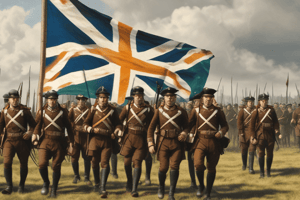Podcast
Questions and Answers
What was the primary goal of FF's agricultural policies regarding wheat production in Ireland?
What was the primary goal of FF's agricultural policies regarding wheat production in Ireland?
What was the function of the Irish Sugar Company established in 1933?
What was the function of the Irish Sugar Company established in 1933?
What impact did the strict censorship imposed by the Irish government have on the population during the specified period?
What impact did the strict censorship imposed by the Irish government have on the population during the specified period?
What was the main reason Dev decided to withhold payments to Britain?
What was the main reason Dev decided to withhold payments to Britain?
Signup and view all the answers
How did Britain respond to the Free State's decision to withhold land annuity payments?
How did Britain respond to the Free State's decision to withhold land annuity payments?
Signup and view all the answers
What was the purpose of the Emergency Imposition of Duties Act passed by the Dáil in 1932?
What was the purpose of the Emergency Imposition of Duties Act passed by the Dáil in 1932?
Signup and view all the answers
What was a significant consequence of the economic war between the Free State and Great Britain?
What was a significant consequence of the economic war between the Free State and Great Britain?
Signup and view all the answers
Why was Britain keen to resolve the economic war with the Free State?
Why was Britain keen to resolve the economic war with the Free State?
Signup and view all the answers
What was the primary reason Éamon de Valera sought to dismantle the right of appeal to the Judicial Committee of the Privy Council?
What was the primary reason Éamon de Valera sought to dismantle the right of appeal to the Judicial Committee of the Privy Council?
Signup and view all the answers
How did the abdication of Edward VIII in 1936 influence Éamon de Valera's political agenda?
How did the abdication of Edward VIII in 1936 influence Éamon de Valera's political agenda?
Signup and view all the answers
What was the significance of the External Relations Act passed by Éamon de Valera's government?
What was the significance of the External Relations Act passed by Éamon de Valera's government?
Signup and view all the answers
What was a key provision within the 1937 Constitution drafted by Éamon de Valera?
What was a key provision within the 1937 Constitution drafted by Éamon de Valera?
Signup and view all the answers
Why did Éamon de Valera strategically avoid declaring the Free State a republic in the 1930s?
Why did Éamon de Valera strategically avoid declaring the Free State a republic in the 1930s?
Signup and view all the answers
What was the primary economic impact of the 1938 Anglo-Irish Trade Agreement on tariffs and quotas?
What was the primary economic impact of the 1938 Anglo-Irish Trade Agreement on tariffs and quotas?
Signup and view all the answers
Why was the return of the three ports to Ireland a significant achievement for the Free State?
Why was the return of the three ports to Ireland a significant achievement for the Free State?
Signup and view all the answers
How did Éamon de Valera initially challenge the authority of the Governor-General, James MacNeill?
How did Éamon de Valera initially challenge the authority of the Governor-General, James MacNeill?
Signup and view all the answers
What was the Statute of Westminster's role in the removal of the Oath of Allegiance?
What was the Statute of Westminster's role in the removal of the Oath of Allegiance?
Signup and view all the answers
What was the financial component of the 1938 Anglo-Irish agreements?
What was the financial component of the 1938 Anglo-Irish agreements?
Signup and view all the answers
Why did Britain ultimately not react to the abolishment of the Governor-General post in 1937?
Why did Britain ultimately not react to the abolishment of the Governor-General post in 1937?
Signup and view all the answers
What was the initial economic condition imposed on the Irish Free State by Britain?
What was the initial economic condition imposed on the Irish Free State by Britain?
Signup and view all the answers
How did the CNG (Cummann na nGaedhael) party attempt to delay the removal of the Oath of Allegiance?
How did the CNG (Cummann na nGaedhael) party attempt to delay the removal of the Oath of Allegiance?
Signup and view all the answers
Flashcards
Anglo-Irish Agreements 1938
Anglo-Irish Agreements 1938
A series of agreements that improved trade and diplomatic relations between Ireland and Britain, including financial and defense provisions.
Economic War
Economic War
A conflict between Ireland and Britain over trade and financial matters, notably land annuities and tariffs.
Land Annuities
Land Annuities
Payments made by Ireland to Britain for land, a contentious issue that sparked the Economic War.
Oath of Allegiance
Oath of Allegiance
Signup and view all the flashcards
Dev's Government Actions
Dev's Government Actions
Signup and view all the flashcards
Governor-General
Governor-General
Signup and view all the flashcards
Statute of Westminster
Statute of Westminster
Signup and view all the flashcards
Irish Neutrality
Irish Neutrality
Signup and view all the flashcards
FF's Agricultural Policy
FF's Agricultural Policy
Signup and view all the flashcards
Guaranteed Prices for Wheat
Guaranteed Prices for Wheat
Signup and view all the flashcards
Censorship in Ireland
Censorship in Ireland
Signup and view all the flashcards
Dev's Economic Controversy
Dev's Economic Controversy
Signup and view all the flashcards
British Tariffs
British Tariffs
Signup and view all the flashcards
Emergency Imposition of Duties Act
Emergency Imposition of Duties Act
Signup and view all the flashcards
Cold Cattle Pact
Cold Cattle Pact
Signup and view all the flashcards
Judicial Committee of the Privy Council
Judicial Committee of the Privy Council
Signup and view all the flashcards
DeV's reforms against the Treaty
DeV's reforms against the Treaty
Signup and view all the flashcards
Constitution Act of 1936
Constitution Act of 1936
Signup and view all the flashcards
New Constitution of 1937
New Constitution of 1937
Signup and view all the flashcards
Study Notes
Irish Economy Under Fianna Fáil (FF)
- FF aimed for larger, more efficient farms, shifting focus from cattle to wheat production for self-sufficiency.
- Introduced agricultural policies with guaranteed wheat prices to encourage farmers to switch crops.
- Established a semi-state sugar company in 1933.
- Implemented strict censorship during World War II, including controlling newspapers, war-related news, and public forecasts.
- Faced controversy when Dev, in 1932, refused to pay debts owed to Britain, leading to tariffs on Irish exports.
- In response, the British imposed tariffs on Irish beef and cattle in 1934.
- A 1935 agreement (the "Cold Cattle Pact") addressed the economic conflict and trade deficit between Ireland and Britain.
- Further, Anglo-Irish agreements in 1938 resolved outstanding financial debts, returned ports, and eased tensions. This improved Irish independence.
Irish Censorship and Wartime Information Control
- During WWII, FF strictly controlled information through censorship measures.
- War-related news, death notices of Irish soldiers, and films dealing with the conflict were highly restricted.
Irish-British Economic Relations (1930s)
- Trade disputes intensified between Ireland and Britain.
- Ireland's trade deficit doubled from 1932 to 1934.
- Britain imposed tariffs to recoup money owed in repayments for land.
- Economic conflicts were resolved by 1938 through treaties that focused on reducing tariffs and quota agreements.
Anglo-Irish Relations: Oath Controversy
- The oath of allegiance was a significant point of contention during the Irish treaty negotiations.
- Devolution's government moved to remove the oath, sparking British protests.
- Later, The Free State's actions were deemed legitimate according to Westminster.
Post-Treaty Developments: Constitutional Issues
- The position of Governor-General was under scrutiny and ultimately ended in the 1930s.
- Internal political conflicts rose within the Free State.
- The Irish government tried to limit or remove the right of appeal to the Judicial Committee of the Privy Council over constitutional issues.
- This eventually met with legal confirmation through the Privy Council's decision.
- 1937 saw the enactment of new constitutional elements and documents, ending the Governor-General's role and focusing on the Commonwealth.
Studying That Suits You
Use AI to generate personalized quizzes and flashcards to suit your learning preferences.
Related Documents
Description
Explore the Irish economy under Fianna Fáil, including agricultural policies and the shift to wheat production. Learn about wartime censorship and information control during World War II. Review the Anglo-Irish agreements that resolved financial debts and improved Irish independence.




